Photographs: K Parvez/Reuters
On November 2, a suicide bomber exploded his motorcycle outside a posh hotel on Rawalpindi's Mall Road, killing 34 people.
On October 28, a powerful car bomb ripped through a crowded Peshawar market, killing 105 people, many of them women and children.
Pakistan has been reeling under a relentless wave of terror strikes, targeted primarily against security forces, police and government officials. But the two recent attacks chillingly proved that terrorists now had no compunctions in targeting civilians.
According to unofficial estimates, the country has witnessed over 420 terror attacks this year, and the civilian casualty toll has crossed 2,000.
Rediff.com looks at the factors that led to our troubled neighbour earning the sobriquet of 'the most dangerous country in the world' and the ominous implications it has for India.
Who is bombing Pakistan?
Image: Family members pray over the grave of Sidra Khalid, who was killed in the Islamabad university blastPhotographs: Adrees Latif/Reuters
The Taliban and its Pakistani unit, the dreaded Tehrik-e-Taliban, have claimed responsibility for many of the terror attacks across Pakistan.
However, there have been instances when both outfits have denied carrying out the attack, as in the case of the Peshawar blast, when Tehrik-e-Taliban chief Hakimullah Mehsud claimed that controversial US security firm Blackwater had masterminded the attack.
The Taliban has also accused Pakistan's secret agencies of carrying out terror strikes in public places to 'bad mouth the TTP'.
"We are fighting the holy jihad in accordance with Islamic Shariah and consider the killing of a single Muslim as unjustifiable. The Taliban only target the army, police, secret agencies and state ministers," claims a leaflet being distributed by the Taliban.
Who is Hakimullah Mehsud?
Image: Teenaged boys being trained to become suicide bombers by the Taliban and (inset) Hakimullah MehsudPhotographs: Abdul Rehman/Reuters
Hakimullah, the new chief of the TTP, hails from the powerful Mehsud Pushtun tribe and is the cousin of dreaded Taliban chief Baitullah Mehsud, who was killed in an American drone attack in August.
He had served as a spokesman for Baitullah and led Taliban militants in the Khyber and Orakzai tribal agencies, where he imposed the infamous jiziya (tax) on Sikhs, forcing them to flee the area.
Hakimullah has good contacts with Lashkari Jhangvi, a fanatic Sunni outfit. He has good contacts in Punjab and Sindh and has trained a large number of Punjabi Taliban militants in South Waziristan.
Why are the Taliban and the Tehrik-e-Taliban targeting Pakistan?
Image: A Pakistani soldier during an army operation in South WaziristanPhotographs: Faisal Mahmood/Reuters
The Taliban and the TTP unleashed a wave of terror attacks to retaliate the Pakistan army's offensive against them in Swat Valley, launched in May, and the recent one in South Waziristan.
South Waziristan is considered the heart of the Taliban militia in Pakistan, and top leaders, including Hakimullah, are believed to be hiding in its mountainous terrain.
The Taliban have also claimed that the terror strikes are to avenge the lives of the innocent civilians killed in random strikes by American drones.
Why did the Pakistan government launch offensives in Swat and South Waziristan?
Image: Residents of South Waziristan at a camp in Dera Ismail Khan in NWFPPhotographs: Akhtar Soomro/Reuters
Swat, which was once a popular tourist destination, had become a hotbed of Taliban insurgency. Militants had virtually displaced the federal government, imposing Shariah and their brand of hard-line moral codes on the locals.
Pakistan President Asif Ali Zardari tried to emulate the balancing act of his predecessor General Pervez Musharraf, who had pledged to crackdown on the Al Qaeda-Taliban-Jihadi nexus after the 9/11 attacks, but continued to appease the burgeoning Islamic militia in the country's tribal areas.
However, Zardari failed miserably in his efforts, when the Taliban blatantly violated a fragile ceasefire and continued on their religious rampage.
When Taliban militants took over Buner District, barely 60 miles from capital Islamabad, the Pakistan government finally realised that it was facing the imminent danger of being overthrown by the hard-line militants, who were intent on creating an Islamic state.
President Zardari finally launched the offensive in Swat, to flush out militants from the country's restive areas, under tremendous pressure from the United States.
Why didn't the Pakistan government take any action against militancy earlier?
Militancy is the Frankenstein monster that the Pakistan government created to further its own ends, which is now threatening to destroy its creator.
Pakistan has always considered India as its enemy no. 1 and the biggest threat to its sovereignty in South Asia. Uneasy over India's growing economic and political clout, the powerful Pakistan army covertly nurtured Islamic militancy for years -- to encourage insurgency in Kashmir and as a possible deterrent against its powerful neighbour.
While Pakistan's intelligence agencies supplied arms, ammunition and financial support, the government in Islamabad willingly turned a blind eye to their activities, as the militants spread their tentacles in the country's hilly western borders.
But the 9/11 attack on the United States changed all that. The enraged US administration invaded Taliban-ruled Afghanistan, launching its War on Terror. In an interview years later, former Pakistan dictator-turned-president Pervez Musharraf revealed that Deputy Secretary of State Richard Armitage had threatened him into supporting the offensive against the Taliban.
The militants in Pakistan's lawless tribal areas perceived Mushrraf's action as a betrayal by an opportunist government which had used them against India but was willing to discard them under American pressure.
Eight years later, the end to War on Terror seems nowhere in sight, and it has left Pakistan wounded and bleeding.
How will these terror strikes affect India?
Image: Jamaat-e-Islami members demonstrate against 'India's occupation of Kashmir' in KarachiPhotographs: Athar Hussain/Reuters
"We want an Islamic state. If we get that, then we will go to the borders and help fight the Indians," TTP chief Hakimullah recently stated brazenly.
For a long time, India was a common enemy for both the Pakistani establishment and the militants taking over its tribal areas. The nation's military has always focused all its energy and effort in building up its resistance and resources against India. The army has traditionally strengthened its eastern borders along India, ignoring the western border with Afghanistan, where militancy has flourished.
The suicide attack outside the Pakistan Aeronautical Complex in Kamra, which is linked to the nation's nuclear programme, raises the horrifying possibility of the country's nuclear arsenal falling into the militants' hands.
Though the Pakistan government has repeatedly assured the West about the safety of its nuclear weapons, the attack in Kamra and the attack on the Pakistan army's general headquarters in Rawalpindi "shows the deepening reach of the militant network, as well as its rising sophistication and inside knowledge of the security forces," according to the New York Times.
Taliban militants, who have been indoctrinated in anti-India rhetoric, will not hesitate to push the nuclear button against New Delhi. Incidentally, Pakistan is the only nuclear-armed country in the world where the army, not the civilian government, has access to the requisite trigger to set off its nuclear pile.
India also has to be wary of the possibility of Taliban militants overthrowing the civilian government in Islamabad and succeeding in their mission of creating an Islamic state. Experts have repeatedly warned against the possibility of the troubled nation imploding under the double blow of the global meltdown and the Taliban insurgency.
India, which already has to contend with an aggressive China, will have to shore up resources to tackle the likely collapse of Pakistan and a military onslaught by the resurgent Taliban.
Has the Pakistan administration completely cut off its militant links?
Image: A commando at the Aeronautical Complex in Kamra, which has been targeted by the Taliban twicePhotographs: Adrees Latif/Reuters
Unfortunately, it hasn't. Many top officials in the Pakistan army and intelligence agencies are still obsessed over the perceived threat from India.
India's growing involvement in developmental efforts in Afghanistan has also raised many eyebrows among the top echelons of the Pakistan government, who interpret it as India's efforts to consolidate its presence in their backyard.
"The Pakistan military believes that American and British military will withdraw from Afghanistan -- and when they do, they will need old Taliban friends and militants such as Jalaluddin Haqqani and his son Sirajuddin to minimise the influence of India in its Afghan backyard," stated a report in The Telegraph, London.
This is why the Pakistan government has kept its hands off certain Taliban groups, including Mullah Omar's Quetta shura, the Haqqani network and Gulbuddin Hekmatyar's Hezbi-Islami, which continue to strike North Atlantic Treaty Organisation forces in Afghanistan with impunity, says a CNN report.
"Some elements in the Pakistani national security establishment have got into the habit over decades of using militant extremists as an unconventional counterweight to Indian regional influence," believes David Kilcullen, author of the best-selling The Accidental Guerrilla.
Do the people of Pakistan support the Taliban?
Image: A child and his mother visit a memorial for soldiers at the Pakistani army headquarters in RawalpindPhotographs: Faisal Mahmood/Reuters
Fed up with a perpetually unstable government, rampant corruption and wide-spread poverty, many Pakistanis, especially those living in under-developed border areas, initially supported the jihadis. The government's offensive against them, in the wake of the 9/11 attacks, was seen as Pakistan being dragged into an American war.
Feelings against the US among the populace reached their zenith when unmanned American drones started carrying out strikes in the lawless regions of Federally Administered Tribal Area and the North Western Frontier Province. Though the US army has achieved some degree of success -- TTP chief Behtuallh Mehsud was killed in a drone strike in August -- the strikes have claimed several innocent lives.
However, the militants began losing popular support when the overzealous Taliban imposed their version of Shariah after taking over Swat valley. Dress codes were imposed on both men and women, many girls' schools were destroyed, 'errant' locals were publicly flogged, humanitarian agencies were thrown out and police personnel were beheaded.
The relentless wave of violence across Pakistan, often targeting civilians in public places, has forced many citizens to turn against the jihadi-Taliban groups.
While the official death toll due to terror attacks in 2009 so far is approximately 500, experts believe that the actual number of casualties is much higher. Though information released by the government agencies is restricted and the media has been barred from the war-torn areas of the country, sources claim that over 2,000 people have been killed due to terror attacks in Pakistan this year.
"Support for Pakistani army operations against the Taliban has increased from 28 percent two years ago to 69 percent today. Support for suicide bombings has dropped from 33 per cent to 5 per cent in Pakistan over the past several years. The number of Pakistanis who feel the Taliban and Al Qaeda operating in Pakistan are a 'serious problem' has risen from 57 per cent to 86 per cent since 2007," says a CNN report by Peter Bergen.
"The recent wave of suicide attacks and terror alerts is making families and shopkeepers nervous that their next visit to a restaurant or market could end in carnage," says a report by the Pakistani daily Dawn.
The report also highlights the rising hopelessness among the country's police force.
"A suicide bomber can strike the middle of this queue, but we come to work fully prepared for death because there is no alternative," a police constable told the paper.
Is there an end in sight for the crisis?
Image: Children displaced by the offensive in Swat Valley play at the Yar Hussain camp in Swabi districtPhotographs: Faisal Mahmood/Reuters
The road to peace seems to be a long, long one for Pakistan -- a nation that is now at war with itself, according to the South Asia Terrorism Portal. The resurgent Taliban, with active support of the Al Qaeda from across the border and Islamic militants from within the country, is proving to be a tricky adversary.
The country also has to strengthen its democratic and economic infrastructure if it wants to shed the dubious distinction of being the breeding ground of global terrorism. Thousands of poor, unemployed youths are lured into militancy and jihad as it is the only alternative to escape crushing poverty.
"Eighty per cent wealth of the country is controlled by seven per cent of the population. Landlords rule the roost in rural Pakistan and are even known to run private armies and prisons to oppress the poor. The bureaucratic and military elite eats up 40 per cent of revenues," says defence expert and rediff.com columnist Colonel Dr Anil Athale.
What is Pak's long-term ally US doing?
Image: US President Barack Obama with Afghanistan President Hamid Karzai and Pak President Asif Ali ZardariPhotographs: Kevin Lamarque/Reuters
The United States, which has often hailed Pakistan as its greatest ally in the War on Terror, has provided financial, military and developmental aid to the beleaguered country since 2001. But it has repeatedly ruled out the possibility of sending troops to fight the militants on the ground, saying it will take no step to 'infringe on Pakistan's sovereignty'.
But ties between the two nations have been strained in the aftermath of American drone strikes in Pakistan's tribal areas. The Obama administration has paid no heed to Zardari's and Pakistan Prime Minister Yusuf Raza Gilani's pleas to stop the drone strikes.
Tensions between the two allies were also heightened by Musharraf's controversial statement -- when he confessed that US aid to Pakistan for the War on Terror had been diverted to strengthen defences against India.
Recently, the US pledged an aid package of $7.5 billion, over the next five years, for 'military and humanitarian assistance in Pakistan'. In an effort to clip the wings of the powerful army, the US administration has also insisted on greater civilian oversight of the military, as a pre-condition to providing the aid.

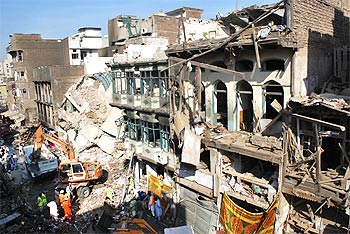


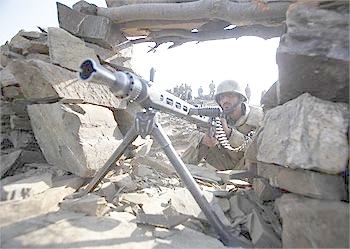
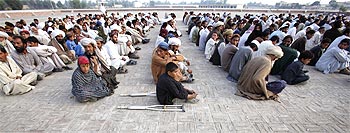
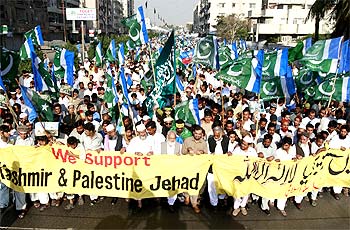
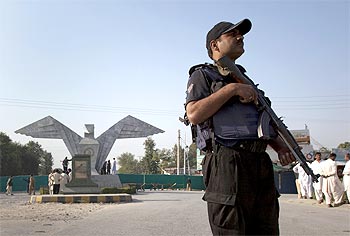
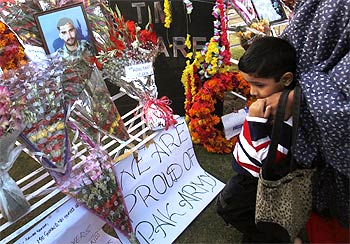

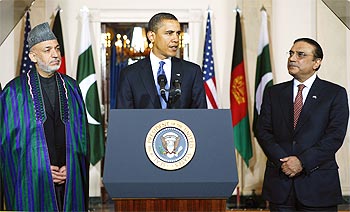
article